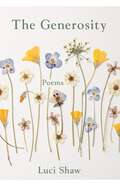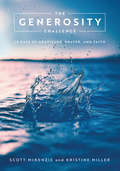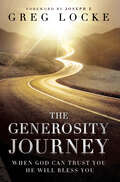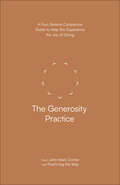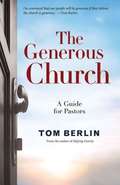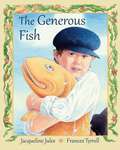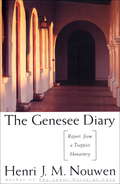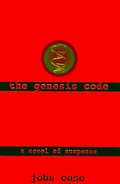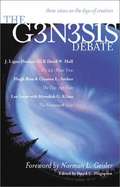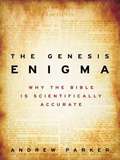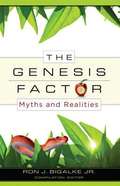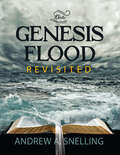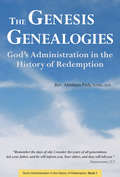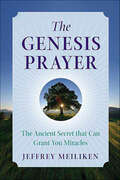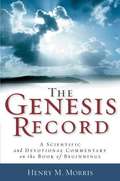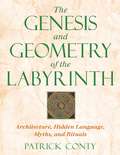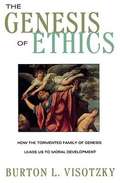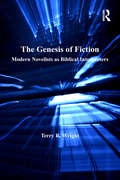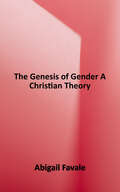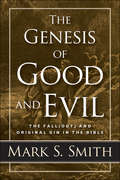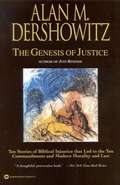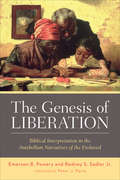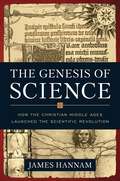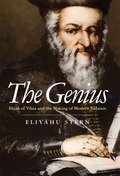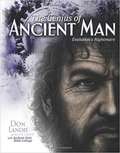- Table View
- List View
The Generosity (Paraclete Poetry)
by Luci Shaw"Rejoice, readers, as you receive the generosity of Luci Shaw's 76 new grace-infused parable poems. Autobiography once more merges with theology as these poems illuminate in splendored natural detail how the seasons of creation parallel and explain the seasons of her life as a poet. Again and again, these poems shower us with glorious epiphanies from the natural world as it reflects God's generosity at work such as "spring's impossible news of green." These poems confirm that in poetry as in faith "ripeness is all." Like Wordsworth, Luci is celebrated for being a highly gifted landscape poet whose works are rich in imagery from the physical world—meadows filled with seeds, flowers, and also poems which are like "shoots" in Luci's writing life. Animals, too, great and small (beetles, cricket, and voles to bears and whales) play a major role in Luci's poetics of creation; God is likened to a great bear who leaves paw tracks for us to follow. In their deep faith and vibrant colors and designs, the poems in Generosity might be considered Luci's Book of Kells. We need to be like Luci's father who carried her poems in his briefcase to show his friends." —Philip C. Kolin, Author, Reaching Forever: Poems; Distinguished Professor of English (Emeritus), University of Southern Mississippi
The Generosity Challenge: 28 Days of Gratitude, Prayer, and Faith (The Generosity Challenge)
by Kristine Miller Scott McKenzieWe are born in the image of a loving and generous God; we are born to be generous. In this 4-week group study, those seeking to live a more generous life will be exposed to and inspired by cultural, generational, and family attitudes towards generosity. Aimed at those who are regularly in the pews, but who have not yet committed to financial giving, the study offers a weekly reading, accompanied by seven days of challenges in the forms of self-assessment, journaling, and prayer, as well as leader helps to facilitate the group experience. After 28 days, readers will be encouraged to embrace the life-giving journey toward generosity and provided a road map on how to get there.Additional resources include a 4-session DVD to spark discussion within the small group.
The Generosity Journey: When God Can Trust You He Will Bless You
by Greg LockeThe Holy Spirit will not just tell you who to help, but how to do it. After reading this book, I will have the knowledge and understanding about the power of generosity from a biblical standpoint. No longer will I give in small doses out of fear or religiosity, but I will have full confidence that my God will take what I give and do exceedingly and abundantly more than I ever could have asked for or imagined with it. Unlock the secrets of biblical giving as Pastor Greg Locke explores the spiritual principles behind generosity and the incredible blessings that follow when God finds someone He can trust. Filled with real-life anecdotes, biblical wisdom, and practical insights, this book is a road map to accessing the abundance that flows from a generous spirit. It not only emphasizes the importance of blessing the poor but also shows how giving can be a weapon in spiritual warfare and help believers experience supernatural breakthrough. Exploring tithing, the principles of stewardship, and the law of sowing and reaping, The Generosity Journey reveals the keys to experiencing supernatural release and what it takes for Christians to be entrusted with more. According to Locke, nothing will change a believer&’s life more than biblical giving. Generosity is the remedy for materialism and the ultimate game-changer for walking in the abundance and favor of God. In this book, readers will discover the joy of giving, the power of faith, and the extraordinary rewards that come when they align themselves with God's generous plan. The journey to a more fulfilling and blessed life starts here!
The Generosity Practice: A Four-Session Companion Guide to Help You Experience the Joy of Giving
by Practicing the Way John Mark ComerDiscover the counterintuitive joy and freedom found in generosity—a Practice that reflects our happy, generous God—in this guide from New York Times bestselling author John Mark Comer and the team at Practicing the Way.In a world driven by consumerism and self-interest, the ancient biblical practice of generosity is both radical and transformative. This Companion Guide to the Generosity Practice from Practicing the Way offers spiritual exercises, reflection questions, and guided readings across four sessions and an optional bonus session. Featuring four engaging video sessions, the Generosity Practice course is designed to be run with your community and is available online for free.This guide will help you:• Lean into Jesus&’ teaching that there is more joy in giving than receiving• Identify and combat the culture of consumerism and greed • Embrace the biblical concept of stewardship in all areas of life• Develop a heart for the poor and marginalized• Create a sustainable plan for generous livingExperience a life of purpose, joy, and deeper connection with God and others through the Practice of generosity.
The Generous Church: A Guide for Pastors (Defying Gravity)
by Tom BerlinOur possessions can create unbearable weight and affect our abilityto serve and thrive. How do we defy gravity and find freedom? In this4-week small group study and stewardship campaign, pastor and author TomBerlin explores what is required to sustain a vibrant life, what weneed versus what we want, and what we can do to avoid being pulled intothe orbit of materialism. The Generous Church helps the pastor and leadership team thinkstrategically about financial planning and giving beyond the annualcampaign vision. Tom Berlin believes and teaches that the church, inorder to inspire generosity in individuals, needs to be seen andunderstood as generous. People will embrace giving if they see the waystheir gifts are used in the community and the world. Generous church…generous people.Sermon helps and fresh illustrations will be included, broken down intofour segments: Think About It – How do I think through the key aspects of our church’s financial reality and plan? Communicate It – How do we tell our story so the whole congregation shares a vision who we are, what we do, and what changes we can make in the world with our people and resources. Plan It – What’s the short-term campaign plan, the annual plan, and our long-term plan for the financial and spiritual life of our congregation? Manage It - How do we set up processes, reports, goals, and metrics to stay true to our plan?
The Generous Fish
by Jacqueline JulesInspired by Jewish folklore, The Generous Fish is the story of a young boy named Reuven who takes a verse from scripture to &“cast your bread upon the waters&” (Ecclesiastes 11:1) quite literally. The result of his daily act is a giant talking fish with golden scales! Boy and fish spend idyllic days together until the villagers realize those scales are real gold. Every villager has good reason to ask for one. Devorah needs clothes for her children. Old Joseph needs money for a cane. The fish says he has plenty to share. But he grows weak from giving away too much, too fast. Can Reuven stand up to the village and save his friend? Through a unique friendship between a boy and a magic fish, award-winning author Jacqueline Jules has created an environmental fable sure to generate discussion in the classroom and at home. What happens when we want something that depletes another's resources? Frances Tyrrell's finely detailed illustrations delightfully capture a child's innocent love for the natural world. An author's note provides biblical sources on human interaction with the environment.
The Genesee Diary
by Henri NouwenDuring his seven-month stay in a Trappist monastery, Henri Nouwen had a unique opportunity to explore crucial issues of the spiritual life and discover "a quiet stream underneath the fluctuating affirmations and rejections of my little world." Nouwen participated fully in the daily life of the Abbey of the Genesee in upstate New York -- in work and in prayer. From the early weeks in the abbey -- dominated by conflicting desires and concerns -- to the final days of Advent, when he finds a new sense of calm expectation, Nouwen never loses his critical honesty. Insightful, compassionate, often humorous, always realistic, The Genesee Diary is both an inspiration and a challenge to those who are in search of themselves."The Genesee Diary beautifully lifts the heart and mind to God."--Christianity Today"This is an extraordinary account of a man seeking inner peace and total commitment to God... a fine portrait of cloistered life, a beautifully written account of one man's soul-searching."--Publisher's Weekly
The Genesis Code
by John CaseA phone call in the dead of night brings Joe Lassiter shattering news. His sister and young nephew have died in a fire in their home near Washington, D.C. Yet Lassiter soon learns a chilling fact: His loved ones were brutally murdered before the blaze was set... The mysterious suspect's identity only raises more questions. Then Lassiter uncovers another crime--another innocent mother and child murdered. The more he unearths, the larger the web of conspiracy grows, as his search for answers leads him on a dangerous international chase toward a truth that will shock him--and the world--to the very bone...
The Genesis Debate: Three Views on the Days of Creation
by David G. HagopianAre the Genesis creation days 24 hours long? Ages of time? Or a literary framework? In The Genesis Debate, three teams of evangelicals committed to the infallibility and inerrancy of Scripture tackle this question head-on by presenting and defending their respective views in a lively, yet friendly, forum. J. Ligon Duncan III and David W. Hall defend the view that the Genesis creation days are six, sequential days, each 24 hours long (the 24-hour view). Hugh Ross and Gleason L. Archer defend the view that the Genesis creation days are six sequential ages of time of unspecified but finite duration (the day-age view). And Lee Irons with Meredith G. Kline defend the view that the Genesis creation days are presented as normal days, but that the picture of God's creating in six days and resting on the seventh is figurative (the Framework view). Whether you are new to the creation-day debate or have followed it for some time, The Genesis Debate will deepen your understanding and strengthen your faith.
The Genesis Enigma
by Andrew ParkerDoes modern science - while agreeing with Darwinian evolution, the big bang theory and the complexity and deep age of the universe - prove the order of creation as described in the Bible to be true? It takes just one page in the Bible to describe the creation of the universe, the Earth, the sky, the seas and all life on the planet. But a close reading will reveal that it is written in a very odd order. Light is mentioned twice - in 'let there be light' and secondly in 'let there be lights . . . to divide the day from night'. Whales appear before birds. Vegetation appears after 'let there be light' but before day is separated from night. In The Genesis Enigma Andrew Parker argues that the reason the Genesis account is strangely ordered is, amazingly, that it precisely reflects the order of events as we now understand them. The latest reinterpretation of Earth's ancient rocks and fossils and their comparisons with animals today has completed our understanding of the history of the Earth and of life. By comparing the data of science with the words and phrases of Genesis 1-11 the remarkable parallels become clear. In a fascinating and controversial scientific detective story Andrew Parker reveals how the latest modern understanding corresponds in unerring detail with the creation account in Genesis. His astonishing conclusions will revolutionise how many of us view the debate between science and religion, and asks the question: in a scientific world is there still a place for God?
The Genesis Factor
by Ron J. Bigalke Jr.Genesis is among the most controversial books of the Bible - facing increasing attacks on its credibility and its meaning within the modern Church as fashionable theories of intelligent design and progressive creationism gain support. Compromising the literal interpretation of Scripture to reconcile faith instead with faulty scientific reasoning on the history of the earth, many within the church are abandoning the very foundational truths of Christianity. Join Ron Bigalke Jr. and influential creationist leaders in discussing the myths and realities of Genesis. In The Genesis Factor you will: Unearth the historical roots of creationism in the church - from the apostle Paul and John, to the Venerable Bede, Martin Luther, John Calvin, Francis Bacon, Galileo, James Ussher, Issac Newton, and others. Learn of the 19th century controversy between leading geologists and the "scriptural geologists" in uncovering the foundations of the oft-contentious relationship of science to Christianity and the Scriptures. Read the Scriptural interpretations that answer the questions regarding the length of a Creation week day. Study point by point the recognized standards of writing history which Genesis 1-11 meet as literal history. This powerful and needed defense of Genesis includes contributors Henry M. Morris, Christopher Cone, Terry Mortenson, Eugene Merrill, Ron J. Bigalke Jr., Tas Walker, Jonathon Henry, Larry Vardiman, John Whitcomb, and Donald DeYoung. From fossil evidence, geologic evidence, and historic evidence, and more, The Genesis Factor reinforces the validity of the scriptural account of Creation, the Great Flood, and the Tower of Babel.
The Genesis Flood Revisited
by Andrew SnellingModeled after the 1961 ground-breaking book The Genesis Flood by Drs. Whitcomb and Morris, this detailed work builds on that classic volume with new insights from decades of work by the author, Dr. Andrew Snelling, and numerous colleagues. This recent revolution in geology and the explosion in geological research have established an even firmer basis for understanding the biblical Flood with a God-honoring foundation — the absolute authority and inerrancy of God’s Word. Examine details of the Creation Week as it builds a solid scriptural case for the Flood’s catastrophic nature and global extent. Find decisive answers to many questions about the Flood and Noah’s Ark, its construction, and the animals taken onboard. Delve deeply into astonishing geological details that unfold from the early chapters of Genesis, including the Creation Week and the pre-Flood world. Explore detailed evidence and a concise, informative 30-page color section with diagrams, maps, and more! Dr. Snelling jettisons the faulty evolutionary-uniformitarian assumptions used by most geologists and instead, interprets compelling new geological and observed field data within the biblical framework for the earth’s history. He also demonstrates that fossils were catastrophically buried in sedimentary layers being deposited rapidly on a global scale on the continental plates derived from the violent rifting apart of the original supercontinent. His work demolishes radiometric dating, the icon of the millions of years dogma, and builds a thoroughly powerful case for a young earth that explains many geological features such as varves, evaporites, coal, oil, chalk, granites, and more that biblical skeptics sadly have used to scoff at God’s Word. Discover the powerful truth behind the earth’s most enduring mysteries!
The Genesis Genealogies: God's Administration in the History of Redemption
by Abraham ParkA basic part of understanding one's ancestors is knowing when they were born, how long they lived, and when they died. Here in The Genesis Genealogies lies that crucial core information about the forebears of Christianity.Rev. Abraham Park has meticulously analyzed the information in The Book of Genesis. <P><P>Taking the precise date references in Genesis and performing math calculations forward and backward in time, he builds a complete chronological timeline from Adam to the Exodus-allowing us to more deeply understand the layers of meanings that the text offers.
The Genesis Prayer: The Ancient Secret that Can Grant You Miracles
by Jeffrey MeilikenA prayer that promises miracles"This book is for anyone who wants a miracle, has ever wanted to see God's work in action, or needed proof of His existence. It is for the doubters and believers alike.If you think nothing is out there, think again. Whether you're an agnostic astrophysicist or a seminary priest, you will discover an ancient gift that works every time, no questions asked. By the time you finish this book, your perception of the universe will have changed.If you thought God was out there but not listening, you may discover that you have been tuning into the wrong channels. It doesn't matter whether you want to call it the Light Force of God, the creative power of the Lord, or any other expression of omnipotent omniscience because as you'll soon discover, you have the ability to tap into it. In fact, you've had the ability all along.If you ever wondered if anyone was listening or if anyone cared, you'll soon see for yourself the benevolence that's been available to you and all of us since the dawn of time. You'll learn why the ancient sages said the Light Force always gives, always listens, and always answers. Find out how to get heard. Find out what you've been missing. See an infinite stream of miracles spread out before you, guiding your every step. As you rethink everything you've ever known, you'll see that life is not supposed to be difficult; man isn't supposed to suffer; fate isn't some abstraction beyond our control, and your life can indeed be wonderful".--From the Introduction
The Genesis Record: A Scientific and Devotional Commentary On The Book Of Beginnings
by Henry M. MorrisMassive and scholarly, but written for scientific and theological lay persons, this book combines the findings of many disciplines.
The Genesis and Geometry of the Labyrinth: Architecture, Hidden Language, Myths, and Rituals
by Patrick ContyA groundbreaking look at the phenomenon of the labyrinth, connecting this ancient symbol to modern scientific principles. • Illustrated with labyrinths from around the world and throughout history. • Demonstrates how the labyrinth differs from a maze and how it is a tool for interpreting ancient myths and religious beliefs. • Draws parallels between the labyrinth and quantum physics, showing how through the secrets of the labyrinth we can unlock the mystery of life itself. The powerful symbol of the labyrinth exists in countless cultures spanning the globe from Africa and ancient Greece to India, China, and pre-Colombian North and South America. For centuries they have been used for religious rituals, meditation, and spiritual and physical healing. In the labyrinth humanity finds a model of the quintessential sacred space that depicts the most profound levels of consciousness. Its center is regarded in many cultures as a door between two worlds, thus providing individuals with the ideal place for self questioning and meditation. In a comprehensive exploration of this time-honored symbol, Patrick Conty shows how the geometrical construction of the ancient labyrinth corresponds exactly with today's modern geometry, illustrating that recent developments in math and physics parallel the science of ancient civilizations. By looking at the way the two systems complement each other, Conty draws new conclusions about the ancient world and how that world can benefit us right now. Conty explores not only physical labyrinths but also reveals how the same transcendent principles are at work in Celtic knot work; the designs of ancient Chinese cauldrons; the tattoos and tracings of primitive art; the textiles of Africa, Peru, and Central America; and the geometric patterns in Islamic art.
The Genesis of Ethics
by Burton L. VisotzkyBurton L. Visotzky, one of America's most respected scholars of religion, guides readers through a close reading of the narratives of the Book of Genesis, exposing their brutal power and revealing how their moral dilemmas apply to ethical issues we face in our lives today. Rabbi Visotzky has led highly regarded seminars, attended by novelists, poets, editors, filmmakers and critics, Fortune 500 CEOs, bankers, and attorneys. He also was a major participant in Bill Moyers' PBS Genesis series. His reading of Genesis opens the door to moral development for all readers--Christians, Jews, Muslims, and secularists. As Burton Visotzky says, the Book of Genesis seems to be, at least on first reading, "an ugly little soap opera about a dysfunctional family . . . a story about rape, incest, murder, deception, brute force, sex, and blood lust. But these stories reveal much about human dilemmas and ethical problems that mirror our own lives. By delving into the lives of Abraham, Sarah, Isaac, and Esau and holding up these characters of Scripture to the light of critical inquiry, Burton Visotzky reveals much that is fresh and useful about ethics and morality. "He is a rabbi who is earthy, playful, and full of insight, who refuses to draw a veil over the dark side of the Bible or of our own contemporary experience. " --Thomas Cahill, author of How the Irish Saved Civilization "[Visotzky] has a wonderfully earthy, human touch to his commentary, a perspective that can be especially refreshing for Christians who have seen the 'Old Testament' sanitized or ignored by their own tradition. " --San Francisco Chronicle "Thrilling original insights . . . a new way to see and feel these old, old sentences. " --The New York Times Magazine "Visotzky delights in turning the gem of each story so that its facets, especially the darkest ones, gleam out at us. . . . The Genesis of Ethics is a unique contribution to Bible discussion. . . . One can only applaud and thank him. " --Naomi Rosen, Congress Monthly
The Genesis of Fiction: Modern Novelists as Biblical Interpreters
by Terry R. WrightThis book considers a range of twentieth-century novelists who practise a creative mode of reading the Bible, exploring aspects of the Book of Genesis which more conventional biblical criticism sometimes ignores. Each chapter considers some of the interpretive challenges of the relevant story in Genesis, especially those noted by rabbinic midrash, which serves as a model for such creative rewriting of the biblical text. All the novelists considered, from Mark Twain, John Steinbeck and Thomas Mann to Jeanette Winterson, Anita Diamant and Jenny Diski, are shown to have been aware of the midrashic tradition and in some cases to have incorporated significant elements from it into their own writing. The questions these modern and postmodern writers ask of the Bible, however, go beyond those permitted by the rabbis and by other believing interpretive communities. Each chapter therefore attempts to chart intertextually where the writers are coming from, what principles govern their mode of reading and rewriting Genesis, and what conclusions can be drawn about the ways in which it remains possible to relate to the Bible.
The Genesis of Gender: A Christian Theory
by Abigail FavaleThe question of gender—who we are as men and women—has never been more pressing, or more misunderstood. <p><p> Weaving personal experience with expert knowledge, Dr. Abigail Favale provides an in-depth yet accessible account of the gender paradigm: a framework for understanding reality and identity that has recently risen to prominence. Favale traces the genealogy of gender to its origins in feminism and postmodern thought, describing how gender has come to eclipse sex, and how that shift is reshaping language, law, medicine, sexuality, and our own self-perceptions. <p><p> With substance, clarity, and compassion, Favale teases out the hidden assumptions of the gender paradigm and exposes its effects. Yet this book is not merely an exposé—it is also a powerful, moving articulation of a Christian understanding of reality: a holistic paradigm that proclaims the dignity of the body, the sacramental meaning of sexual difference, and the interconnectedness of all creation. The Genesis of Gender is a vital, timely resource for anyone seeking to better understand the gender paradigm—and how to live beyond it.
The Genesis of Good and Evil: The Fall(out) and Original Sin in the Bible
by Mark SmithFor centuries, the Garden of Eden story has been a cornerstone for the Christian doctrine of “the Fall” and “original sin.” In recent years, many scholars have disputed this understanding of Genesis 3 because it has no words for sin, transgression, disobedience, or punishment. Instead, it is about how the human condition came about. Yet the picture is not so simple. The Genesis of Good and Evil examines how the idea of “the Fall” developed in Jewish tradition on the eve of Christianity. In the end, the Garden of Eden is a rich study of humans in relation to God that leaves open many questions. One such question is, Does Genesis 3, 4, and 6, taken together, support the Christian doctrine of original sin? Smith’s well-informed, close reading of these chapters concludes that it does. In this book, he addresses the many mysterious matters of the Garden story and invites readers to explore questions of their own.
The Genesis of Justice: Ten Stories of Biblical Injustice that Led to the Ten Commandments and Modern Law
by Alan M. DershowitzFrom Gethesmane to the Grave: A commentary on the Passion Narratives in the Four Gospels
The Genesis of Liberation: Biblical Interpretation In The Antebellum Narratives Of The Enslaved
by Emerson B. Powery Rodney S. Sadler Jr.Considering that the Bible was used to justify and perpetuate African American enslavement, why would it be given such authority? In this fascinating volume, Powery and Sadler explore how the Bible became a source of liberation for enslaved African Americans by analyzing its function in pre-Civil War freedom narratives. They explain the various ways in which enslaved African Americans interpreted the Bible and used it as a source for hope, empowerment, and literacy. The authors show that through their own engagement with the biblical text, enslaved African Americans found a liberating word. The Genesis of Liberation recovers the early history of black biblical interpretation and will help to expand understandings of African American hermeneutics.
The Genesis of Science: How the Christian Middle Ages Launched the Scientific Revolution
by James HannamThe Not-So-Dark Dark AgesWhat they forgot to teach you in school:People in the Middle Ages did not think the world was flatThe Inquisition never executed anyone because of their scientific ideologiesIt was medieval scientific discoveries, including various methods, that made possible Western civilization's "Scientific Revolution"As a physicist and historian of science James Hannam debunks myths of the Middle Ages in his brilliant book The Genesis of Science: How the Christian Middle Ages Launched the Scientific Revolution. Without the medieval scholars, there would be no modern science.Discover the Dark Ages and their inventions, research methods, and what conclusions they actually made about the shape of the world.dle Ages were a time of one intellectual triumph after another. As Dr. Hannam writes, "The people of medieval Europe invented spectacles, the mechanical clock, the windmill, and the blast furnace by themselves. Lenses and cameras, almost all kinds of machinery, and the industrial revolution itself all owe their origins to the forgotten inventors of the Middle Ages."In The Genesis of Science you will discoverWhy the scientific accomplishments of the Middle Ages far surpassed those of the classical worldHow medieval craftsmen and scientists not only made discoveries of their own, but seized upon Eastern inventions-printing, gunpowder, and the compass-and improved them beyond the dreams of their originatorsHow Galileo's notorious trial before the Inquisition was about politics, not scienceWhy the theology of the Catholic Church, far from being an impediment, led directly to the development of modern scienceProvocative, engaging, and a terrific read, James Hannam's Genesis of Science will change the way you think about our past-and our future.
The Genius
by Eliyahu SternElijah ben Solomon, the "Genius of Vilna,” was perhaps the best-known and most understudied figure in modern Jewish history. This book offers a new narrative of Jewish modernity based on Elijah's life and influence. While the experience of Jews in modernity has often been described as a process of Western European secularization—with Jews becoming citizens of Western nation-states, congregants of reformed synagogues, and assimilated members of society—Stern uses Elijah’s story to highlight a different theory of modernization for European life. Religious movements such as Hasidism and anti-secular institutions such as the yeshiva emerged from the same democratization of knowledge and privatization of religion that gave rise to secular and universal movements and institutions. Claimed by traditionalists, enlighteners, Zionists, and the Orthodox, Elijah’s genius and its afterlife capture an all-embracing interpretation of the modern Jewish experience. Through the story of the “Vilna Gaon,” Stern presents a new model for understanding modern Jewish history and more generally the place of traditionalism and religious radicalism in modern Western life and thought.
The Genius of Ancient Man: Evolutions Nightmare
by Don Landis Jackson Hole Bible CollegeEvidences and commonalities explored from ancient man around the globe! <p><p> Why structures echoing the Tower of Babel have been recreated on almost every continent and major culture. What artifacts and archaeology, technology and innovation, really reveal about the origin of mankind. Why many biblical symbols (rainbows, human sacrifice, mountains, the Son/ sun worship) were, and continue to be, distorted in pagan religious practices. What the historical record reveals about Satan’s “counterfeit” of God’s plan for humanity. <p><p> All over the world there are similar findings of ancient religions, cities and towers, world travel, advanced astronomy, and civilized government. Over the course of two years, a team of researchers from Jackson Hole Bible College has worked to bring together the different pieces of the convoluted mystery and history of ancient man. <p><p> Hours of researching, trips to various sites around North and Central America, visits to museums, and meetings with experts have provided the team with an overwhelming amount of evidence for the intelligence of these early innovators. A jumble of anomalies and magnificent structures continue to confound archaeology and anthropology today, yet as the dots are connected, one finds history as described in the biblical record.
